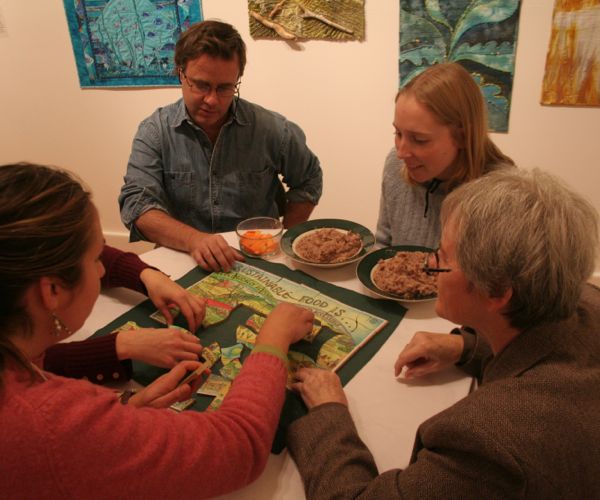Sustainable Food & Community Development
A strong food movement has emerged in recent years that is building positive community-based food systems. Dr. Alan Warner has been investigating education and community facilitation efforts that can enable citizens to work together to transition to a community food system that promotes sustainability and wellness, relative to the current industrialized system with its detrimental impacts on the health, economy and environment of local communities. Working with students and faculty colleagues, he has designed, implemented and documented a community adult education program called Great Meals for a Change. It involves community members hosting a sustainable meal and a series of interactive activities that help participants reflect on their local food system and purchasing habits, including how they can take steps to becoming more active and sustainable food citizens. This action research has been shared through community, professional and academic presentations and through program descriptions and academic publications.
This work has also included a number of student research projects. Chaiti Seth's masters research has identified key factors and processes in shifting towards more healthy, just and sustainable university food systems, using Acadia University as an ethnographic case study, while examining findings in the broader national context. This research has been part of an ongoing effort, which has had notable successes, to transform the Acadia food system toward sustainable, healthy, just and accessible food offerings. Melissa Grandberg has organized a serious of focus groups with women farmers to consider the benefits and barriers to sustainable farming based on gender. Jessica Wall completed an honours action research project in 2017, which piloted and assessed the Wolfville Local Food Bucks program in which individuals and families using the Wolfville Food Bank received food coupons to enable them to purchase food at the Wolfville Farmers Market. This supports both food security and local agriculture. The pilot was successful and the program continues each summer, and the information has been helpful to Farmers' Markets Nova Scotia in developing similar programs across the province. Previously, Jenna Khoury Hanna examined how participatory food costing may bear fruit as an educational process through which consumers can reflect on their purchasing values and habits. Stephanie McGlashan worked with the Our Food Project in Halifax to identify best practices through which community organizations can facilitate positive food environments at the community and policy levels. Alan Warner is on the Advisory Board of the Acadia Farm and is working with students and administrators on campus to facilitate engagement in sustainable food opportunities and choices on campus.

